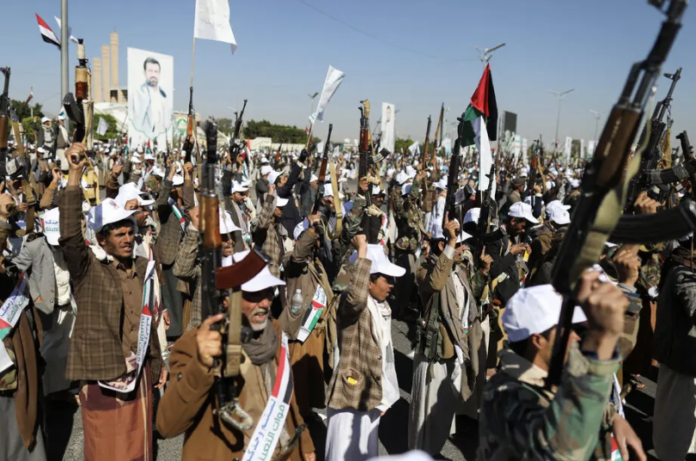The assassination of a senior Hamas leader in Lebanon and mysterious twin bombings in Iran are raising fears of a regional war that could involve the United States.
American, Israeli and Lebanese officials insist that few sides want Israel's war in Gaza to become a wider conflict that will engulf the Middle East.
But the assassination of a Hamas leader in Lebanon on Tuesday and the deaths of dozens in mysterious twin bombings in Iran on Wednesday threatened to push the Middle East — and the United States — closer to the brink of the kind of regional war the Biden administration has sought to avert since Hamas' deadly attacks on Israel on Oct. 7.
Just hours after the explosion in Iran, the United States and 12 of its allies issued a written warning to another militia group in the region, the Yemeni Houthis, who have launched near-daily missile, drone and naval strikes against commercial vessels.
So far, the United States has refrained from retaliating against Houthi bases in Yemen, in large part because it does not want to undermine a fragile truce in Yemen's civil war.
A senior Iranian official said the dispatch of warships, joining an Iranian reconnaissance ship already in the region, was intended to signal Iran's support for the Houthis and raise the stakes. But the official said Iran has no plans for warships to engage in confrontations with U.S. Navy ships in the waterway.
President Biden has said he wants to avoid direct military attacks on the Houthis to avoid escalating the Middle East conflict.
"We remain extremely concerned about the risk of the conflict spreading to other fronts," State Department spokesman Matthew Miller told reporters on Wednesday.
Hezbollah, the powerful Lebanese militant group, vowed that the killing of Saleh al-Aruri, the leader of Hamas, in a suburb of Beirut on Tuesday would not go unanswered. A key ally of Hamas, Hezbollah effectively controls the southern suburbs of Beirut where the blast occurred and has been escalating clashes with Israeli forces for months.
The circumstances surrounding the explosions at the memorial to former Iranian general Qassim Soleimani in Kerman, Iran, were more hazy. While Iran has been quick to blame Israel, European and American officials have said they doubt the Israelis carried out the strike: Most of their actions against Iran have been targeted, from eliminating the chief architect of Iran's nuclear program to blowing up specific nuclear weapons.
Israeli officials did not comment on whether their forces targeted Mr. al-Aruri, but Lebanese and American officials attributed the attack to Israel.
After the strike, Biden administration officials made plans to step up diplomatic efforts with officials in Lebanon as part of an effort to pressure Hezbollah not to escalate the conflict. Secretary of State Anthony J. Blinken is expected to travel to the Middle East in the coming days, where containing potential escalation will be one of his main goals.
"The probability of a regional war in the Middle East goes from 15 percent to 30 percent," said retired Admiral James Stavridis, a former NATO commander. "Still relatively low, but higher than before, and certainly uncomfortably high."
But Biden administration officials and Middle East analysts noted that while Hezbollah and Iran have engaged in skirmishes and proxy attacks against Israel, they are not necessarily seeking to expand the conflict.
In recent weeks, the Biden administration declassified intelligence that indicated Iranian paramilitary groups were coordinating Houthi attacks by providing targeted information on commercial shipping passing through the waterway and the Suez Canal. Israel is heavily dependent on shipping in the Red Sea.
In response to the attacks, the United States established a multinational naval group to protect commercial shipping in both the Red Sea and the Gulf of Aden.
Pentagon officials have drawn up detailed plans to strike missile and drone bases in Yemen, as well as some sites that appear to be home to the speedboats used to attack the Maersk container ship. But there are concerns that such strikes would play into Iran's strategy of trampling Israel and its allies on multiple fronts.
But the most serious threat to contain the conflict in Gaza arose on Tuesday after the killing of al-Aruri .


